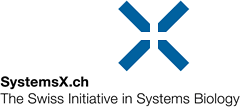Archive
The Human Body: the ultimate frontier of complexity
Why do we age? How do we become sick? How does our memory work? The documentary film about SystemsX.ch, titled “The Human Body: the ultimate frontier of complexity", shows how researchers from a variety of disciplines are embarking together on a journey to the center of our cells, looking for answers to these, and many more, questions.
Watch the film »
Digital pathology toolbox
The Bodenmiller group at the University of Zurich has developed a novel digital pathology toolbox (histoCAT) which allows an interactive analysis of tissue architecture at the single cell level. They use their toolbox to highlight the importance of cell organization and interactions in breast cancer and how this can be used for patient classification.
This research was supported by a SystemsX.ch Transition Postdoc Fellowship as well as the RTD Project PhosphoNetPPM and the MRD Project MetastasiX.
Read the paper published in Nature Methods »
RNA Molecules Live Short Lives
A research group at the Biozentrum, University of Basel, has developed a new method to measure the half-life of RNA molecules. The study revealed that commonly used methods provide distorted results and that RNA molecules live an average of only two minutes, ten times shorter than previously assumed. The results have been published in the journal "Science Advances" (Image: University of Basel, Biozentrum). The study was supported by the SystemsX.ch Research, Technology and Development (RTD) project StoNets.
Read the article published by the University of Basel »
First characterization of an ancient, most dosage-sensitive plant gene
It is the first deep characterization of a very conserved plant-specific protein that displays a highly dosage-sensitive action. The appearance of this gene in evolution correlates with the emergence of true sieve elements in angiosperms. This research was supported by a SystemsX.ch Interdisciplinary PhD Project.
Read the article on PNAS »




